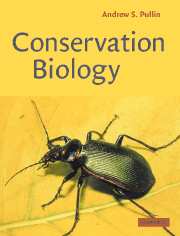Chapter 6 - Non-sustainable use
Published online by Cambridge University Press: 05 June 2012
Summary
In this chapter the fate of those species that have been directly exploited for human use, either as food, materials, pets or status symbols is considered. The reasons for use, patterns of exploitation and the reasons why the harvesting has often been non-sustainable are discussed. A series of examples and case studies are used to illustrate the wide range of species that are threatened in this way.
By reading this chapter students will gain an understanding of what is meant by sustainable and non-sustainable use of natural resources; gain a knowledge of the extent of exploitation of wild species and of the different types of trade that result in exploitation.
What is sustainable use?
The concept of sustainable use has different meanings in different contexts, for example, it would have different interpretations in economics and ecology. In conservation terms it generally means the use of species or natural communities in such a way that ensures they will remain in a ‘healthy’ state and be available for use by subsequent generations. The United Nations Conference on Environment and Development held in Rio de Janeiro in 1992 (commonly known as the ‘Earth Summit’; see Chapter 7) brought the idea of sustainable development to the centre of the world political agenda. Central to the idea of sustainable development is the sustainable use of natural resources, including wild populations of animals and plants. We saw in Chapter 3 that human societies and economic systems still operate under the ‘Frontier Ethic’: ‘there's always more and its all for us’.
- Type
- Chapter
- Information
- Conservation Biology , pp. 124 - 138Publisher: Cambridge University PressPrint publication year: 2002



